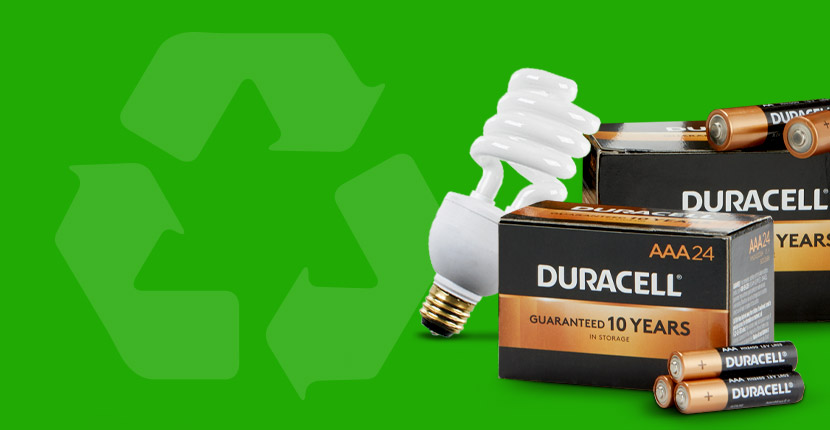America Recycles Day: Recycle Your Used Batteries and Bulbs
Power - by Bryan Veldboom - updated on 11/10/2020

Mark your calendars, Sunday, November 15th is America Recycles Day opens in new window! This day was set aside to help raise environmental awareness by encouraging people to recycle. At Batteries Plus Bulbs we take recycling very seriously. That’s why we’ve made it easy for you to recycle your old batteries and spent light bulbs. Just drop them off at your nearest store and we’ll pass them on to our recycling partners. Here’s a more in-depth look at what we recycle.
What Types of Batteries Do We Recycle?
Due to differences in state and local regulations, there is some variation in the type of recyclable material your store may accept. There may also be a cost for recycling, although this too will vary by location. For the most accurate information, contact your local store and ask them what they accept. The majority of our stores, however, will accept the following types of batteries:
- Lead acid – Lead acid batteries can be found in cars, trucks, golf carts, sump pumps, boats, motorcycles, RVs, lawnmowers, floor scrubbers, UPS systems and more.
- Non-liquid Nickel cadmium (NiCd) – Nickel cadmium batteries can be found in rechargeable devices like cordless phones, drills, camcorders, calculators, electronic flash units and tool battery packs.
- Non-liquid Nickel metal hydride (NiMH) – These batteries are commonly used in exit/emergency lights, flashlights, camcorders, cameras, barcode scanners, back-up power and battery packs.
- Lithium ion – Lithium ion batteries are used to power cell phones, laptops, two-way radios, scanners, tools, flashlights, watches and tool battery packs.
- Household – Used in common devices like TV remotes, kids’ toys, flashlights, video game controllers and wireless headsets.
Since batteries do contain chemicals, we recommend bringing your batteries in a bag, or placing strips of clear tape over the terminals. This will help ensure the safety of both yourself and all store employees.
What Types of Light Bulbs Do We Recycle?
Recycling light bulbs helps reduce landfill waste, repurpose the bulbs’ raw materials and helps to keep chemicals such as mercury out of our water supply. In fact, almost 90% of the material in a light bulb can be recycled. As with batteries, fees may apply and will vary based on bulb type and store location. Contact your store for the most accurate info.
Batteries Plus Bulbs recycles the following types of light bulbs:
- LED
- Compact fluorescent (CFLs)
- Fluorescent tubes
- U bend fluorescent bulbs
- Plastic coated & shatter shield bulbs
- Incandescent
- Soft/flood lamps
- Germicidal & UV lamps
- Halogen
- High pressure sodium
- Mercury vapor
- Cold cathode
- Ballasts
Business Recycling Services
Did you know that we also offer recycling services for businesses? It’s true. Your business will be eligible for our recycling service just by signing up for a free business account. When you choose us as your recycling partner, you can be sure your business is in full compliance with all federal, state, municipal, EPA and DOT regulations.
Plus, you’ll receive a number of additional benefits, including fast, local delivery, tailored service options and competitive volume pricing on thousands of battery and lighting products. Find out more about how to save your business money by signing up for a free business account.
Recycling Makes a Big Difference
Though it might seem small, dropping off your spent batteries and bulbs makes a big difference. How big? Each year, our stores recycle roughly 47.5 million pounds of lead acid batteries and 1.68 million pounds of other battery types. We also recycle over half a million pounds of light bulbs and over 30,000 pounds of ballasts annually. Best of all, recycling creates jobs. According to the National Recycling Coalition, recycling creates four jobs for every one created in the waste management industry. Now, that’s something we call all feel good about. Learn more about our recycling services.

